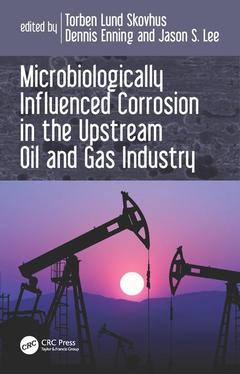Microbiologically Influenced Corrosion in the Upstream Oil and Gas Industry
Coordonnateurs : Skovhus Torben Lund, Enning Dennis, Lee Jason

Microorganisms are ubiquitously present in petroleum reservoirs and the facilities that produce them. Pipelines, vessels, and other equipment used in upstream oil and gas operations provide a vast and predominantly anoxic environment for microorganisms to thrive. The biggest technical challenge resulting from microbial activity in these engineered environments is the impact on materials integrity. Oilfield microorganisms can affect materials integrity profoundly through a multitude of elusive (bio)chemical mechanisms, collectively referred to as microbiologically influenced corrosion (MIC). MIC is estimated to account for 20 to 30% of all corrosion-related costs in the oil and gas industry.
This book is intended as a comprehensive reference for integrity engineers, production chemists, oilfield microbiologists, and scientists working in the field of petroleum microbiology or corrosion. Exhaustively researched by leaders from both industry and academia, this book discusses the latest technological and scientific advances as well as relevant case studies to convey to readers an understanding of MIC and its effective management.
Section I: Materials and Corrosion in Oil and Gas Production. Section II: Microbiologically Influenced Corrosion Fundamentals: Microorganisms and Mechanisms. Section III: Microbiologically Influenced Corrosion Management. Section IV: Field Cases and Laboratory Studies.
Torben Lund Skovhus is Researcher and Project Manager at VIA University College in the Centre of Applied Research & Development in Building, Energy & Environment (Horsens, Denmark). He graduated from Aarhus University, Denmark in 2002 with a Master's degree (cand.scient.) in Biology. In 2005 he finished his PhD from Department of Microbiology, Aarhus University. In 2005, Torben was employed at Danish Technological Institute (DTI) in the Centre for Chemistry and Water Technology, where he was responsible for the consultancy activities for the oil and gas industry around the North Sea. Torben was heading DTI Microbiology Laboratory while he was developing several consultancy and business activities with the oil and gas industry. He founded DTI Oil & Gas in both Denmark and Norway where he was Team and Business Development Leader for five years. Thereafter Torben worked as Project Manager at DNV GL (Det Norske Veritas) in the field of Corrosion Management in both Bergen and Esbjerg.
Torben is currently chair of NACE TEG286X and ISMOS TSC an organization he co-founded in 2006. He is an international scientific reviewer and the author of 50+ technical and scientific papers and book chapters related to industrial microbiology, applied biotechnology, corrosion management, oilfield microbiology, water treatment and safety, reservoir souring and biocorrosion.
Dennis R. Enning is an Engineering Associate at ExxonMobil Upstream Research Company (EMURC) in Houston, TX. He received his M.Sc. and Ph.D. at the Max Planck Institute for Marine Microbiology (Bremen, Germany) where he investigated the fundamental mechanisms of microbiologically influenced corrosion (MIC) by lithotrophic, sulfate-reducing bacteria. He obtained his undergraduate education in microbiology, biochemistry and cell biology at Ludwig Maximilians University in Munich (Germany) and at the University of Edinburgh (UK). In his current role at EMURC, Dr. Enning leads
Date de parution : 03-2017
15.6x23.4 cm
Thèmes de Microbiologically Influenced Corrosion in the Upstream... :
Mots-clés :
ADBAC; Alkyl Dimethyl Benzyl Ammonium Chloride; MIC; 16S rRNA Gene Copy Number; microalgae; bacteria; archaea and fungi; ATP Quantification; microorganisms; Superduplex Stainless Steel; corrosion in petroleum engineering; Carbon Steel Coupons; pipeline corrosion; Weight Loss Coupons; pitting; dealloying; enhanced erosion corrosion; enhanced galvanic corrosion; stress corrosion cracking; andhydrogen embrittlement; Microbial Enhanced Oil Recovery; Robert Heidersbach; Pitting Corrosion Rate; Richard B; Eckert; Sulfur Disproportionation; Bill Amend; Internal Pipe Surface; Ian M; Head; SRB Culture; Jason S; Lee; SRB; Brenda J; Little; SRB Growth; Sven Lahme; Reservoir Souring; Casey Hubert; CP Potential; David Fischer; 16S rRNA Gene; Monica Canalizo-Hernandez; IRB; Amit Kumar; Mohita Sharma; Corrosion Threat; Gerrit Voordouw; Corrosion Rate; Júlia R; de Rezende; APB; Brandon E; L; Morris; Crevice Corrosion; Geert M; van der Kraan; Deep Biosphere; Sandra L; Wilson; dsrAB Gene; Thomas R; Jack; Renato De Paula; Victor Keasler; Erlend Stokstad Andersen; Elizabeth Hillier; Jaspreet Mand; Yin Shen; Heike Hoffmann; Christopher R; Marks; Joshua T; Cooper; Vincent Bonifay; Blake W; Stamps; Huynh M; Le; Brian H; Harriman; Annette De Capite; Kathryn R; Brown; Deniz F; Aktas; Jan Sunner; Bradley S; Stevenson; Kathleen E; Duncan; Michael J; McInerney; Yves Gunaltun; Pierre Souquet; Joseph M; Suflita; John J; Kilbane; Laura L; Machuca; Timothy J; Tidwell; Irene Roalkvam; Karine Drønen; Stefan Jansen; Mirjam van Burgel; Berthil Slim; Jan Gerritse; Jennifer Fichter; Elizabeth J; Summer; Viviane de Oliveira; Diogo Coutinho; Mariana Galvão; Mia Lutterbach; Jodi B; Wrangham; Faisal M; Alabbas



